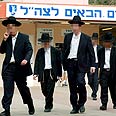




63% of Jews in favor of Shabbat buses
State and Religion Index, conducted by Smith Institute ahead of Rosh Hashana, reveals 62% of public support civil marriage, 52% back same-sex marriage, 87% want everyone to serve in IDF, 79% call for yeshiva budget cuts. Rabbi Uri Regev: Israelis demand equal share of burden
Ahead of the Jewish New Year, the Hiddush association for religious freedom and equality released its 2011 State and Religion Index, which looks into public opinions on key issues.
The index is based on a comprehensive survey conducted by the Smith Institute among 800 respondents – a representative sample of Israel's adult Jewish population (maximum sampling error: 3.4%).
Who wants freedom of religion?
The survey's findings reveal that 56% of Jews in Israel believe state and religion should be separated. Thirty-five percent support this stand "very much" and 21% support it "pretty much". On the other hand, 28% are strongly against it and 16% are somewhat against it.
An analysis according to religious definitions reveals that 85% of haredim, 87% of religious Jews and 54% of traditional Jews oppose separating state and religion, while 80% of seculars are in favor.
Respondents were asked, "Do you agree or disagree that the State of Israel should conduct freedom of religion and conscience – in other words, giving secular and religious Jews the option to act in accordance with their world-view?" Eighty-three percent said yes (60% "very much agree" and 23% "somewhat agree") and 17% said no (10% "strongly disagree" and 7% "slightly disagree").
The haredim are the only sector with a majority opposed to freedom of religion in Israel (51%), while the majority of religious, traditional and secular Jews expressed their support (68%, 84% and 91%, respectively).
What are you afraid of?
The survey's respondents were asked to rate the internal tensions in Israel's Jewish society according to their seriousness – and placed the haredi-secular tensions first (37% of respondents), following by the tensions between Right and Left (33%), rich and poor (14%), Sephardim and Ashkenazim (4%) and immigrants and veteran Israelis (2%).
The majority in all sectors noted haredi-secular tensions as one of the most serious internal tensions in Israel's Jewish society: 58% of haredim, 59% of religious Jews, 63% of traditional Jews and 68% of seculars.
The respondents were also presented with a list of state and religion issues, and asked which one concerns them the most. Twenty-two percent chose the absence of core subject from the haredi curriculum and haredi men's failure to integrate into the labor market as the most urgent issue.
Nineteen percent chose the enlistment of yeshiva students to the IDF, 16% said the main problem was state budgets transferred to yeshiva students, 14% claimed that the main difficulty was the religious-Orthodox monopoly on marriage and divorce, 11% mentioned the conversion issue and 7% noted the Shabbat wars.
Eighty percent believe the core issues should be imposed on the haredim (90% of seculars, 81% of traditional Jews and 75% of religious Jews), while 20% objected (82% of haredim).
Sixty-four percent of the respondents were in favor of revoking the budgets of schools which fail to teach the core subjects (74% of seculars and 67% of traditional Jews), and 28% supported legislation placing a considerable fine on such an offense. Eighteen percent would settle for the current situation in which these schools are partially supported (31% of religious Jews).
Hiddush's State and Religion Index also includes an extensive chapter on parts of the State Budget enjoyed mainly by haredim.
Seventy-nine percent of the respondents (including 92% of seculars, 84% of traditional Jews and 57% of religious Jews) expressed their support for cutting the funds funneled to yeshivot and large families in a bid to encourage haredi men to go out to work. Twenty-one percent (including 85% of haredim) were against this proposal.
Who enlists with IDF?
An examination of the responses to the "urgent issue" in terms of state and religion according to sectors reveals that 51% of traditional Jews and 50% of seculars believe the most serious problem resulting in religious tensions is haredi enlistment.
In light of the number of haredim choosing to study in a yeshiva instead of joining the IDF, 40% of the respondents said all of them should be drafted to full compulsory service (52% of seculars), 37% said they must do national service at the very least (41% of religious and traditional Jews), and 10% said the State must set a quota of exemptions and draft the rest.
Thirteen percent of the respondents (85% of haredim) said the current situation was just fine.
As opposed to secular and traditional Jews, the haredim (74%) and religious Jews (43%) believe that the most serious problem in terms of state and religion is the conversion issue, which surfaced this year when Lithuanian rabbis refused to recognize conversions performed by the army. The issue was solved thanks to Rabbi Ovadia Yosef's intervention.
Hiddush's State and Religion Index reveals that 39% of the respondents believe the State must only recognize Orthodox conversions, 32% are in favor of recognizing any religious conversion from Israel and abroad (including Conservative and Reform conversions), and 29% are willing to accept secular conversions as well, including studies and a ceremony of admission into the Jewish people.
An analysis according to religious definitions reveals that haredi, religious and traditional Jews are mostly in favor of Orthodox conversion (92%, 72% and 47%, respectively), while seculars are divided between religious conversion (any type) and secular conversion (43% each).
Who will marry you?
Another issue which has been making headlines is the Orthodox monopoly on marriage and divorce in Israel.
The survey's results show that 62% of Israelis (including 91% of seculars) want the State to recognize any type of marriage – religious (including Conservative and Reform) and civil. Thirty-eight percent (92% of haredim, 81% of religious Jews and 54% of traditional Jews) object.
Fifty-two percent support marriage or a partnership between two people of the same sex (including 69% of seculars), while 48% object (91% of haredim, 84% of religious Jews and 51% of traditional Jews).
Shabbat debate
Another heated debate in the Israeli society is the nature of Shabbat - is it a regular vacation day or should the Jewish state give it a different touch? Should shopping centers be open? Must everyone not work on Shabbat of all days? And what about public transportation?
The State and Religion Index revealed that a majority of Israeli Jews supports public transportation on Shabbat. Sixty-three percent of the public want to see more bus lines operating over the weekend, while 36% want full public transportation and 27% seek to increase the current volume of activity with buses traveling to nightclubs, medical centers, etc.
Twenty-seven percent are against changing the status-quo and 10% want to cancel the bus lines operating today as well.
Most haredim (57%) demand that public transportation be halted completely on Shabbat. Religious (57%) and traditional Jews (45%) want the current situation to continue, while seculars are in favor of increasing the activity slightly (48%) or fully (45%).
Women respondents were asked what they do, or would do, about segregated buses. Thirty-five percent said they would sit in the back (27% "because it's customary" and 8% "for fear of the passengers' reactions), 18% would act as if it were a regular bus line, and 47% would avoid traveling that way and search for alternative ways to reach their destination.
Ninety-four percent of haredi women and 56% of religious women said they would sit in the back. Fifty-seven percent of secular women and 51% of traditional women would not get on the bus.
According to Hiddush president, Rabbi Uri Regev, "The public has expressed its desire for freedom of religion and conscience in Israel. In order to achieve social justice, the State must apply military or civil service for all, cut yeshiva budgets, integrate yeshiva students into the labor market and force haredi institutions to teach the core subjects.
"The public understands that without sharing the burden it just won't work, and conveys a clear message: Don't be afraid of confronting the haredi parties. Otherwise, the burden on the middle class won't grow smaller – but bigger."
- Follow Ynetnews on Facebook















